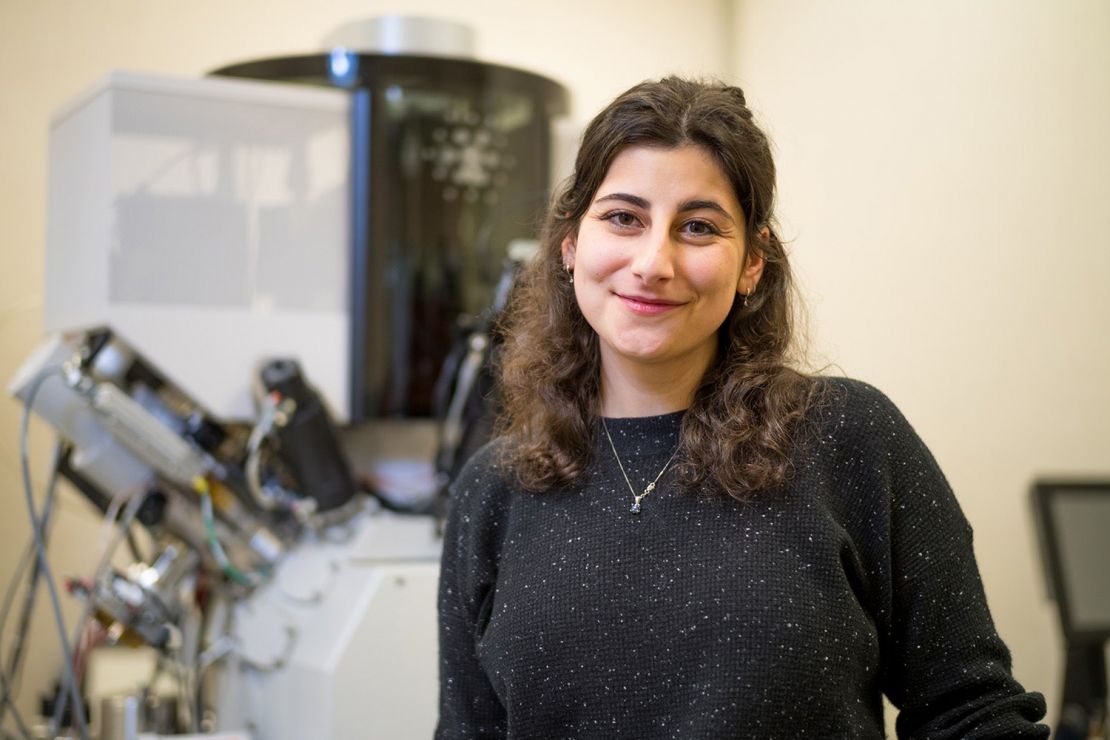Eveline Postelnicu
Postdoctoral Scholar, materials science and engineering
Growing up, I was obsessed with Star Trek: The Next Generation. It seemed like technology made that society more advanced and ethical, and I was excited about what those technologies, like the spaceships, were made of. While interning at Arizona State University in high school, I became interested in how tiny changes in a material’s atomic structure can impact its electronic or mechanical properties.
I completed my PhD in germanium-on-silicon photonics at MIT, specifically looking at how atomic defects impact these materials’ electronic properties and how they interact with light. Today, I’m continuing that research as a postdoc, except now I work on diamond. A few days a week, I work in the Stanford Nano Shared Facilities where I use a focused ion beam to prepare samples I analyze with the transmission electron microscope to identify defects. I also use scanning electron microscopes to observe which wavelengths of light are emitted from a sample and then analyze the data.
The support for postdocs at Stanford is really great and unique. The Office of Postdoctoral Affairs provides a lot of resources and organizes events for community building and career planning. I haven’t decided what I want to do after my postdoc appointment concludes – whether I want to become a professor or go into industry. My hope is that I will always be doing something that excites and fulfills me. And that means being able to study the types of atomic landscapes that yield exciting properties and materials, and working with inspiring colleagues that bring a diversity of perspectives to the team.
Norman Joshua
Shorenstein Postdoctoral Fellow on Contemporary Asia
As an Indonesian and a historian, I have always been captivated by how Indonesia thrived under former President Suharto’s New Order regime for 32 years. Yet at the same time, society also buckled under the illiberal and authoritarian rule of the military.
After the fall of Suharto in 1998, the country began to open up. Many archives became much more accessible and writing about topics like the military and government were no longer taboo nor dangerous. That sparked my curiosity about how societies work, and I later earned my undergraduate degree in history from the University of Indonesia and a PhD in history from Northwestern University.
Today, I spend a lot of time working on my book proposal, which explores the origins of authoritarianism in Indonesia. It’s a story about how the Indonesian state and society – following a four-year revolution after World War II – gradually became preoccupied with order and security. I’m looking specifically at how and why the military became involved in non-military affairs, such as politics, culture, and the economy.
During the winter closure, I’ll be in Indonesia to do some work before the Christmas holiday, like visiting archives and libraries. I’ll also be attending a conference in London to present one of my book chapters.
I’m really enjoying the privilege of being at Stanford. Through the Freeman Spogli Institute for International Studies, the Asia-Pacific Research Center, The Hoover Institution, and other centers, I’ve been able to talk with experts who have inspired my work. I’m really enjoying working with the faculty here – everyone’s been really welcoming and supportive.
Morgan Smith
Postdoctoral Scholar, genetics
I was an athlete in high school and a club athlete in college at the University of Florida where I studied kinesiology and applied physiology. I loved sports and movement and knew I wanted to make a career out of them. My first research experience was studying exercise in rats, which led me to research. I love to ask good questions and dig into the scientific method. While working on my PhD at Auburn University, I worked in the molecular and applied physiology lab where I got to combine physiology on the molecular level with movement.
At Stanford, my postdoctoral fellowship is through the Wu Tsai Human Performance Alliance. I’m working on several studies – at least five. One focuses on relative energy deficiency in sports, or REDs, which is a syndrome of poor health outcomes in athletes and is typically caused by an energy imbalance and low energy availability. We study REDs at the molecular level to identify different metabolites and biomarkers that may correlate with different risk levels of this syndrome. The goal of this research is to support early identification of REDs.
One of my goals as a scientist is to make research findings more accessible to the general population outside of academia. I also hope to create an inclusive and diverse space in my research, and that starts at the inception with study design, not just as an afterthought.
Outside of my research, I mentor an undergraduate and a PhD student. I also play pick-up basketball, pickleball, and I’m taking a Latin dance class. I have a Staffordshire terrier named Reggie (he’s 4), so I’m outside a lot with him. I also love to hike – California is a beautiful place to do that.


